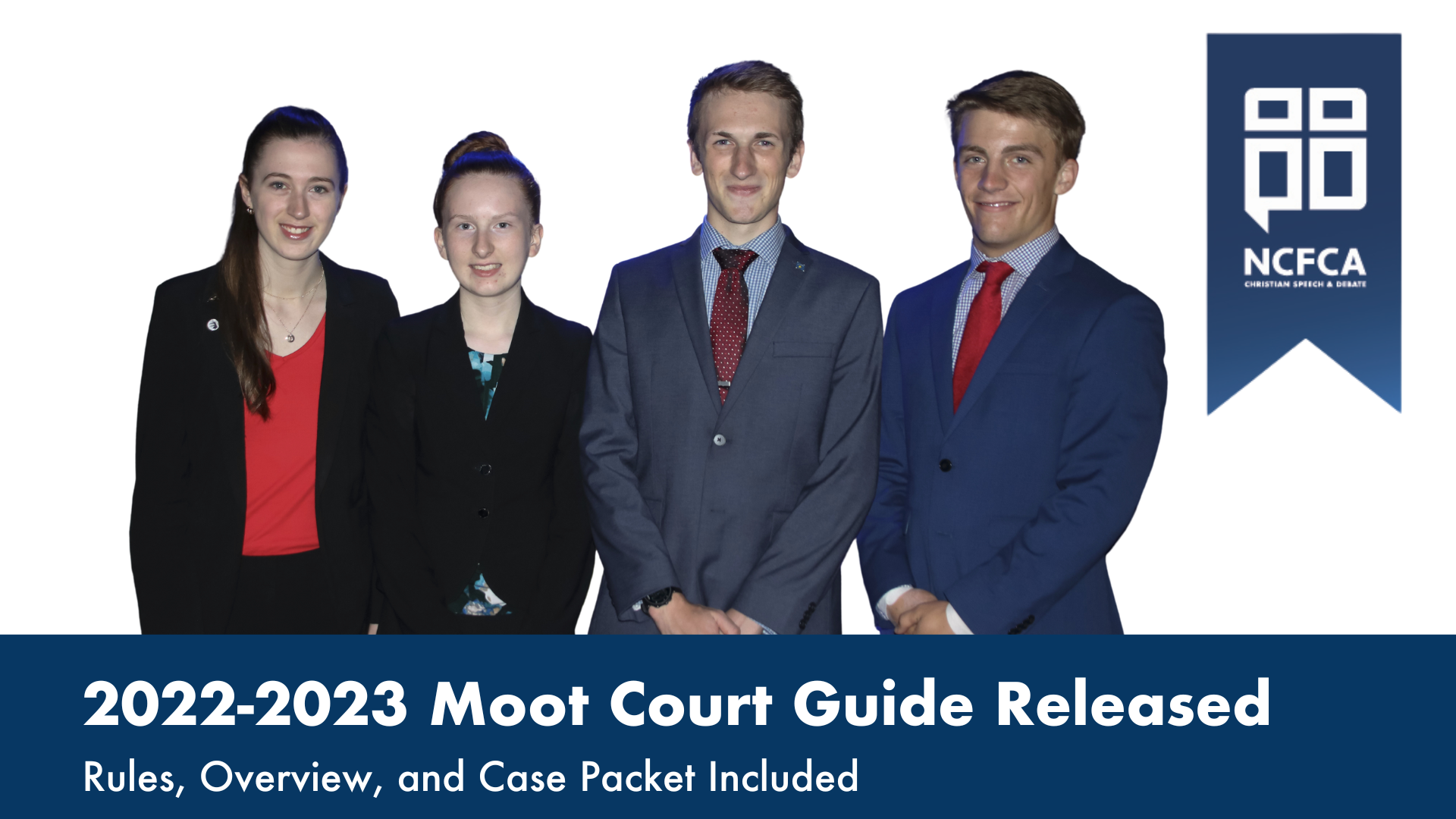

Dear Affiliate Families,
As we begin our ninth season of NCFCA Moot Court and release a case packet that I think our students will really love, I want to offer some reflection and exhortation regarding this special event.
We began offering Moot Court in the 2014-2015 season because we recognized its enduring value and connection to our mission. It provides students with the unique opportunity to strengthen their reasoning and persuasion skills while increasing their understanding of the US Constitution and the judicial system. I think we can all agree on the value of working to equip ambassadors for Christ to speak and think effectively about legal matters, especially those that pertain to the US Constitution.
While the educational value of Moot Court is clear, it does come with several distinct challenges for our league. I feel it’s important to make our affiliates aware of the challenges so that we can keep this event sustainable for the league and beneficial for our students.
Our biggest blessing and challenge with Moot Court is educating our students and parents about the complexities and issues associated with this event. The court cases cited within the fictitious case each season are real. They contain complex ideas that young students may have difficulty following, and they often include facts about crimes that can be disturbing and difficult to process. In contrast with other debate styles, mooters can’t fully set the direction for all of their research; they must be familiar with the cited cases that make up the closed universe to be successful. While we try to screen the cited cases, those cases will often cite other cases that students may feel the need to research. Inevitably some of those cases will contain mature content. There is no way for us to redact enough to keep the Moot Court universe as safe as some might like for high school students. For this reason, we urge parents to think carefully about their students' participation. Some students may not be ready for the complex issues and content even at the higher age threshold that we have in place. I want to personally urge parents to take extra time in evaluating their student’s readiness.
Another challenge we face each season is the need for a large pool of judges with legal expertise, Moot Court experience, or a high commitment to studying and preparing. This experience or preparation is important because argumentation in Moot Court has a different aim and imagined audience than our other debate events. In policy and value debate, we ask students to communicate effectively with people from all walks of life because we want them to be able to speak well into the varied types of cultural and political discussions where we each have a voice. However, the simulated audience for Moot Court is composed of Supreme Court Justices who alone hold the final authority to decide on interpretations of constitutional law. This means our students must learn to craft persuasion that works within that legal context. Appropriate arguments for an appellate court will generally be very different from arguments that would persuade members of the general public. This means that, ideally, our judges need to be familiar enough with matters of constitutional law to discern which arguments are appropriate for the simulated context. Hosting our tournaments online helps us broaden the available judge pool, but we need constant help with recruiting enough well-qualified judges to give competitors the excellent feedback we aspire to provide. Participating families must commit to thinking of themselves as part of the judge recruitment team throughout the season and having at least one parent study and prepare to judge as needed.
We also need a team of Moot Court specialists to help us with the daunting task of finding, writing, or adapting an appropriate case for the high school context each season. This season we have the American Moot Court Association along with Maria Gerber (NCFCA Parent and Attorney), Trace Gerber (NCFCA Moot Court Alum), and Lewis Ringel (Moot Court Director for California State University, Long Beach) to thank for helping us to select, evaluate, and prepare our case. Going forward, we need more volunteers for this team in order to keep Moot Court sustainable in our league. If you or someone you know is qualified and might be willing to serve in this way, please contact our Moot Court committee at [email protected]. We plan to begin work on the case for next season this fall.
After nearly a decade, we remain convinced that Moot Court is worthy of our league rising to the challenges it presents, but it takes a team effort. We encourage all of our families to thoughtfully evaluate the unique benefits and complexities of Moot Court. For some, this will mean the choice to dive in, but for others, caution may be warranted. Our team is praying for willing volunteers and that each family will make the best decision about participation.
In His Service,
Kim Cromer,
Executive Director
NCFCA Christian Speech & Debate